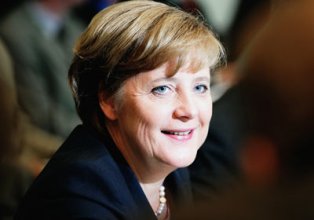 Chancellor Angela Merkel has told the German Financial Times that she would not support premature shutdowns of the country's nuclear plants while they operate safely.
Chancellor Angela Merkel has told the German Financial Times that she would not support premature shutdowns of the country's nuclear plants while they operate safely.Nuclear power plants generate about one third of Germany's electricity, but a coalition government formed after the 1998 federal election made the policy of phasing out nuclear energy under Green environment minister Jürgen Trittin. Currently, under a 2000 compromise, the operational lives of German power reactors are limited to an average of 32 years, although operators can apply to transfer generation time from lesser to more efficient plants. Many similar power reactors in other countries are licenced to safely operate for up to 60 years.
Now, the new coalition government formed in 2005 led by Angela Merkel is less certain of the inherited phase-out policy. Merkel told the Financial Times that her Christian Democratic Union (CDU) party would not support a phase out now "as German nuclear power stations are running well" and that her Christian Social Union (CSU) partners agree with her. However the third coalition group, the Social Democratic Party (SPD), "has made its own decision regarding nuclear energy" and she has "no reason to believe that it will change in the near future."
In the light of this stand-off, Merkel said: "This is why it makes very little sense to talk about it every day." Under current rules, the decision to enforce the phase-out policy lies with the environment minister after consultation with other ministries. The current Minister for the Environment, Nature Conservation and Nuclear Safety is the SPD's Sigmar Gabriel.
Further information
WNA's Nuclear Power in Germany information paper






_15863.jpg)







